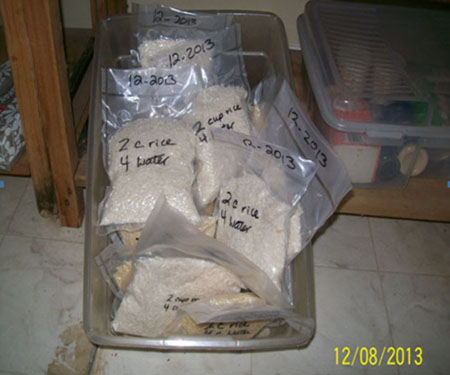
*Rice Storage: Short-Term, Long-Term and Everyday Use*
A little accidental experiment happened tonight at home – with rice.
As Trapper and I have been reorganizing our house; maximizing space and trying to provide room for growth… we've also been RE-inventory-ing.
Rice is a staple in our diet. We both like rice and neither of us care if it's cooked plain or seasoned, etc.
We have a supply in the "store-it-and-forget" area (you know, those items you store properly and forget you have them AS in... NOT TO EVER bother them unless you MUST Area).
BUT!
In our reorganizing effort, I've realized we didn't have nearly enough rice, period.
So, as I wondered aimlessly in the store the other day, I just happened to remember the rice shortage and picked up a small 5 lb. bag. I don't like running so low on rice and I knew 5 lbs. wouldn't go far but it would hold us over until I could do a bulk purchase in addition to what we do have on hand.
Tonight I started the repackaging process.

I repackage and vacuum seal rice in packs of 2 cups of rice for the everyday use and short-term storage. The long-term is sealed in Mylar bags with O2 absorbers and in a food grade 5 gallon bucket.
I finished the repackaging and realized that 5 lbs. of rice was just a little more than 12 cups of rice.
I started doing some math – for the long term storage area.
My "on paper" example:
If I were to cook 2 cups of rice every other day in an emergency situation how much rice do I really need for 1 year?
The results:
5 lbs. of rice = 12 cups
183 days (365/2) x 2 cups of rice cooked each of those days = 366 cups of rice
Divided by 12 cups in a 5 lb. bag
= 31 total (5 lbs. bags or 155 lbs. of rice)
THEN my next mathematical question was how much water would be needed?
So, here we go...
If you cook rice 1:2 cups water you'd have to have 732 cups of water to cook 366 cups of rice which is 46 gallons of water… just for the rice!
I know… if you're adding rice to soups this does not strictly apply, but for other recipes it very well could.
All the food storage articles I read always point to store-what-you-eat and eat-what-you-store and I totally agree… most of them break it down into a caloric intake, which is appreciated, but I have to break it down into quantity, how quantities are packaged, and how much is that "really" based on our needs. And then I always try to add the water need.
Some of the foods stored are going to be useless without water storage or an ample amount of water availability. Many folks flock to the dehydrated meals (maybe family members or close friends of yours and ours) but NEVER consider the amount of water needed to make it useful. I could go on and on just on this topic but I won't... I think this short example is enough.
Another experiment I did on water and food storage is here: Just Add Water Food... How Much Water was That? I was using dehydrated potato soup just to see how much water it would take to rehydrate and use.
Hope this helps someone. I know it helps us as we continue on our path to preparedness.
Vikis
www.alpharubicon.com
All materials at this site not otherwise credited are Copyright © 1996 - 2013 Trip Williams. All rights reserved. May be reproduced for personal use only. Use of any material contained herein is subject to stated terms or written permission.